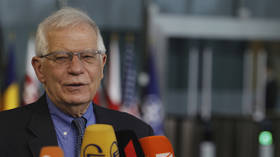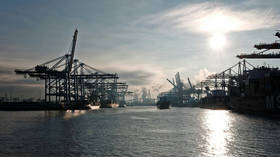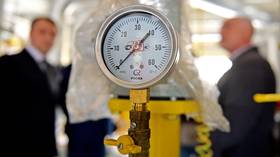EU reveals timetable for Russian oil import ban talks

A ban on Russian oil imports will be discussed at the summit of EU foreign ministers on April 11 as part of the next round of proposed sanctions against Moscow, the EU’s top diplomat Josep Borrell said on Thursday.
Since the beginning of Russia’s military attack on Ukraine, the EU has come up with several rounds of hard-hitting restrictions on Moscow. At the moment officials are discussing a fifth package of sanctions which includes a ban on Russian coal imports.
“It is not in the 5th package of sanctions, which is being discussed today, it is only coal. But it will be discussed on Monday at the Foreign Affairs Council Ministers meeting. Sooner or later – I hope sooner - it will happen,” Borrell told journalists upon his arrival at a NATO ministerial meeting on Thursday.
According to the European Commission website, the EU depends on Russia for around 45% of its coal imports. In March, its members imported a total of 7.1 million tons of thermal coal, which is used in power and heat generation. That is a 40.5% increase year-on-year and the highest level of imports since March 2019.
Speaking on Wednesday to MEPs, Borrell said that the bloc had to urgently cut Russian energy imports. He pointed to the fact that since the launch of Moscow’s offensive on Ukraine on February 24, the EU has transferred Russia €35 billion (more than $38,1 billion) in energy payments.
“We have given Ukraine nearly €1 billion. That might seem like a lot, but a billion euro is what we pay Putin (Russian President Vladimir Putin) every day for the energy he provides us,” the head of EU diplomacy said.
According to Eurostat, Russia is the EU’s biggest oil supplier, providing over a quarter of the bloc’s crude oil imports in 2020 – 113 million tons. Russia also covers roughly 40% of the EU’s natural gas needs.
A week ago, the Russian president criticized the behavior of some Western politicians, saying that they are prepared to sacrifice their citizens’ interests in order to “enjoy the good graces of their overseas master and overlord [implying the US].”
“People are urged to eat less, put on more clothes, and use less heating, give up on travel – presumably for the benefit of the people who are demanding this kind of voluntary deprivation as a sign of some abstract North Atlantic solidarity,” Putin said, referring to the EU’s intention to ban Russian energy imports.
Moscow has been responding to the Western sanctions, which it considers unlawful and unjustified, by imposing harsh counter-measures. In March it significantly expanded its list of “unfriendly” countries which are now subject to various requirements and specific restrictions. For example, Moscow now wants all the states on the list to pay for gas supplies in rubles. Another retaliatory initiative saw the Finance Ministry requesting that Russian companies that want to work with firms from countries on the list receive government permission first.
Moscow attacked its neighbor in late February, following Ukraine’s failure to implement the terms of the Minsk agreements signed in 2014, and Russia’s eventual recognition of the Donbass republics of Donetsk and Lugansk. The German and French brokered protocols had been designed to regularize the status of those regions within the Ukrainian state.
Russia has now demanded that Ukraine officially declare itself a neutral country that will never join the US-led NATO military bloc. Kiev insists the Russian offensive was completely unprovoked and has denied claims it was planning to retake the two republics by force.















